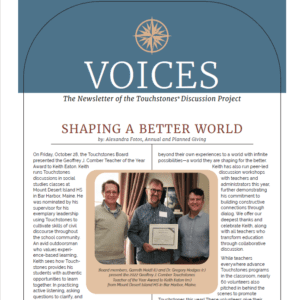By Olivia Braley, Stefanie Takacs, and Howard Zeiderman
For more than 25 years, Touchstones staff ran executive programs in-person in Washington, DC and New York. Although highly customized in many ways, most of those programs had one characteristic in common: none of them featured contemporary texts. In the past seven years, though, we’ve shifted to programs designed increasingly around modern works. The purpose of these programs remains the same: engage professional adults in the process of examining and modifying their presuppositions through collaborative discussion. And while they are all Touchstones programs, these executive offerings depart in some significant ways from the process method we follow in other settings. Instead, the focus here is on self-reflection and using the works read to reveal ourselves more completely. Such efforts, we believe, are useful starting points in forming our futures.
Our newest program—on modern poetry—launches this winter. These texts were selected primarily by Olivia Braley, our Programs and Office Assistant, with input from our Director of Leadership Programs, Howard Zeiderman. Olivia, who joined the Touchstones staff in September, is a poet with an educational background in creative writing from the University of Maryland. She and Zeiderman will co-lead this eight-meeting program.
In choosing the writers for this group, Olivia looked to poets who encompass a wide range of style, subject matter, and personal background. “The world of modern poetry is perhaps more diverse in form and voice than ever,” she says, “and it’s important to look to writers who represent that in their written as well as lived experience.” The featured poets in this program cover multiple spectra of ages, genders, races, ethnicities, and sexualities. These components of their identities emerge in their poetry in ways as varied as they are. All collections on the program reading list are written in the last 20 years and include writers Claudia Rankine, Jericho Brown, Anne Carson, Ilya Kaminsky, and others. This “living” aspect of the poetry invites the group to consider these poems in real time—leading naturally to questions about the role of poetry in our present world. It also raises issues of how language and world interact to shape one another.
Like the poets, the participants in this group come from different backgrounds but are united in their interest to read and consider the role of language as it affects our lives. Though the role of language may be more pronounced in certain fields— such as education or law—all people are sensitive to language, regardless of profession. It is the locus of our humanity. This Touchstones poetry program serves as a way to delve into this sensitivity and explore language working at its most acute. There, the group is concerned with the very structure of language, sounds, and form.



 Join the
Join the